The 10 Most Important Black TV Shows of All Time

10 Most Important Black TV Shows of All Time
Abbott Elementary. Atlanta. The Chi. Queen Sugar. The Other Black Girl. Swarm. There’s no doubt about it: We’re in the midst of The Golden Age of Black Television. “The last few years have been very pivotal in terms of Black creators doing really interesting things on TV,” says Bethonie Butler, the author of the new book Black TV: Five Decades of Groundbreaking Television from Soul Train to Black-ish and Beyond. “That’s why it’s a good time to look back at the last 50, 60 years and see how far we’ve come.”
Indeed, the wealth of fresh content is the culmination of an undeniably long struggle for Black artists to find a voice and fight for representation. Though Black performers have appeared on television for as long as the small screen has been around—Broadway star Ethel Waters hosted a one-off variety show on NBC in June 1939 when television was still in its infancy—quality roles took decades to develop. Most actors were relegated to playing servants or service workers. The first Black sitcom, Amos ‘n’ Andy, originated from a radio program in which two white men portrayed the Black characters. When adapted to TV in 1951 with a Black cast, the actors behaved like caricatures and talked with a broad dialect using a heavy reliance on stereotypical malapropisms. Meanwhile, 1960s stalwarts from The Andy Griffith Show to Bewitched featured zero diversity.
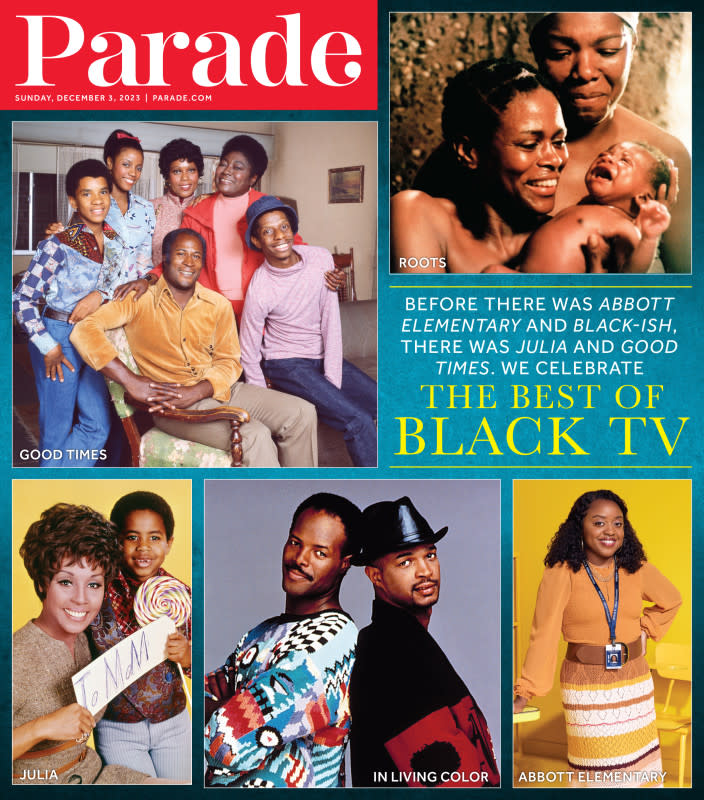
COVER PHOTOGRAPHY BY CBS PHOTO ARCHIVE/GETTY IMAGES; ABC PHOTO ARCHIVES/DISNEY VIA GETTY IMAGES; ABC/MATT SAYLES; 20TH CENTURY FOX/EVERETT; HERB BALL/NBCU PHOTO BANK/GETTY IMAGES
But as TV (and the culture) evolved, Black characters became more prominent and influential. And the likes of Shonda Rhimes, Ava DuVernay and Issa Rae who grew up watching popular shows like The Jeffersons, Family Matters, The Fresh Prince of Bel-Air and Sister, Sister—which captured Black people in various lights and occupations—eventually entered the business and elevated the medium. “They’re telling our own stories on TV and doing it in a way that’s authentic and reflects our experiences and not necessarily what networks are telling them to put on the screen,” Butler says. While she acknowledges that the state of Black TV still isn’t perfect, “we’re definitely headed in the right direction.”
So how did we get to this Golden Age and what does the future look like? Butler covers many more shows in her book, but here’s her rundown for Parade of the 10 most important Black TV shows in history.
Most important Black TV shows in history
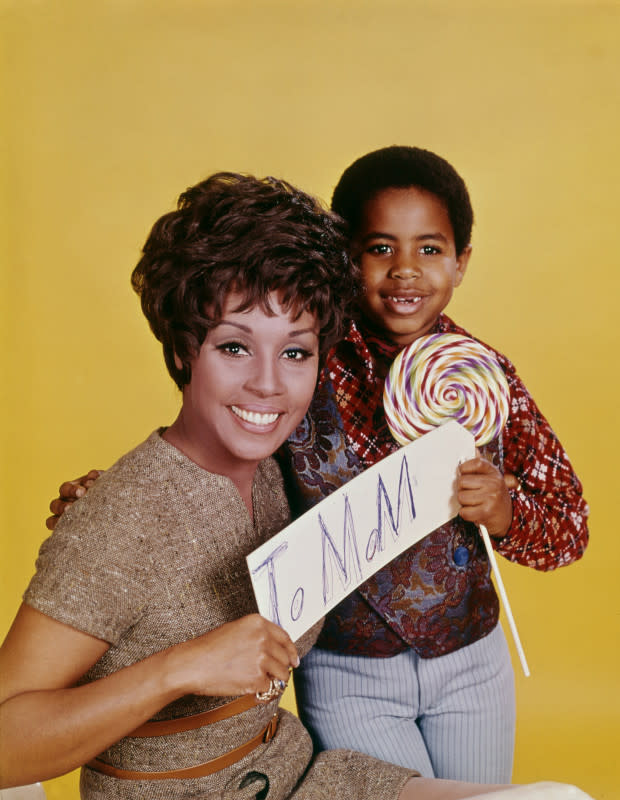
Getty Images
Julia (ABC, 1968-71)
Premise: Diahann Carroll stars as Julia Baker, a nurse who relocates to Los Angeles after her husband gets killed fighting in Vietnam. Now she’s raising her five-year-old son, Corey (Marc Copage), on her own. Paul Winfield, Don Marshall and Fred Williamson appeared over the years as memorable suitors.
Why It Matters: The pioneering sitcom—which premiered just months after the assassination of Martin Luther King Jr.—“was the first time we saw a Black family on TV,” Butler says. “And Julia herself was such a hardworking nurse and mom. It got us over the hump because it showed that you could actually tell our stories.” Carroll made history in 1969 as the first Black actor to be nominated for an Emmy and won a Golden Globe that same year.
Behind the Scenes: On the very first day of the show’s production, Carroll was dismayed that the studio’s makeup department couldn’t provide any products suitable for her skin tone. “The studio had only dealt with the little American girls or European girls,” Carroll, who died in 2019, once said. “How could you have a makeup department and you don’t have makeup for every skin in the United States of America?”
Must-Watch Episode: “Pilot” (Season 1, Episode 1)
Streaming on YouTube
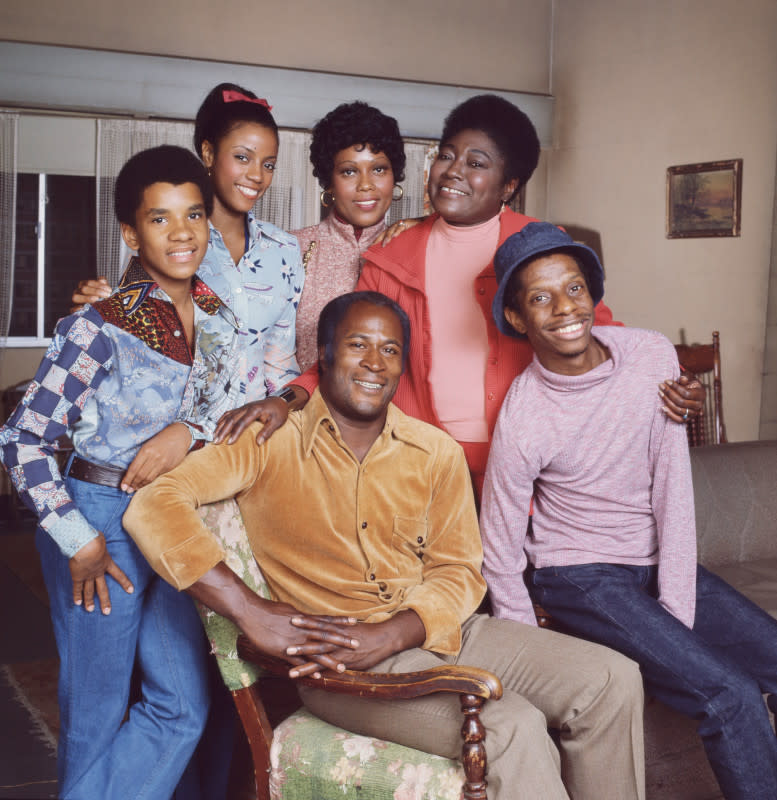
Getty Images
Good Times (CBS, 1974-79)
Premise: In the spin-off of Maude from producer Norman Lear, the Evans family tries to make it work in the Cabrini-Green housing projects of Chicago. James (John Amos) and Florida (Esther Rolle) are the working-class parents raising their three kids—including the lively J.J. (Jimmie Walker). They’d also get visits from their neighbor Willona (Ja’Net DuBois) and superintendent Bookman (Johnny Brown).
Why It Matters: Though Butler says the sitcom wasn’t “necessarily told in the most authentic way all the time,” she commends its impact: “I know [Black-ish creator] Kenya Barris has talked about how much he loved it and respected Norman Lear. And back when there were just a few networks, this show was very popular and everybody was watching.” Even Walker’s “Dy-no-mite!” catchphrase became a national obsession.
Behind the Scenes: After the show started to focus on Walker’s character, tensions among the cast began to boil over. “By the end of the third season, John Amos was so glum and dispirited that it seemed impossible to go on,” Lear wrote in his 2014 memoir. “[So] we decided to write him off the show.” Amos himself admitted to Jet in 2008, “I wasn’t the most diplomatic guy in those days.”
Must-Watch Episode: “The Dinner Party” (Season 2, Episode 19)
Streaming on Peacock and Prime Video
Related: Try Not To Laugh Along With the 41 Best Black Comedy Movies of All Time
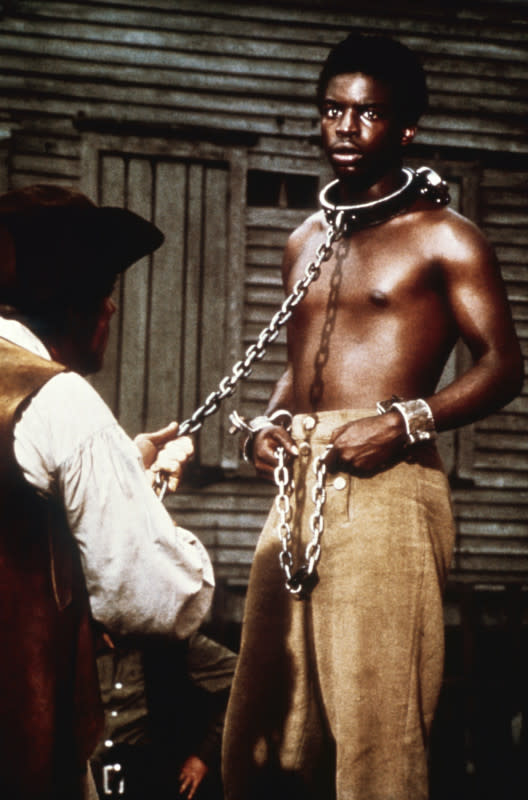
Getty Images
Roots (ABC, 1977)
Premise: Based on Alex Haley’s 1976 novel Roots: The Saga of an American Family, the eight-part miniseries revolves around lead character of Kunta Kinte (LeVar Burton) as he’s taken from Gambia, West Africa, and sold into slavery in America. The sprawling story consists of his experiences and the generations that follow.
Why It Matters: The Emmy-winning drama, which aired consecutively from Jan. 23 through Jan. 30, was unusual at the time for its graphic, violent depiction of slavery and racial injustice. “It was the first time Americans of any race really saw the horrors of slavery,” Butler says. “And everyone was talking about it.” That’s no exaggeration: Its final episode was viewed by more than 100 million people, representing nearly 85 percent of television households at the time.
Behind the Scenes: Burton was a 19-year-old theater major at USC when he auditioned for Kunta Kinte—his first professional audition ever. Remembering the series, he said on Twitter in 2021, “My first day on the set, legendary [Cicely Tyson] played my mother, Bings Kinte. [Maya Angelou] played my grandmother, Nyo Boto. I was in the big leagues. The sole reason I wasn’t intimidated was the actor’s certainty that I KNEW who the character was. I knew that kid. I was that kid!”
Streaming on Prime Video
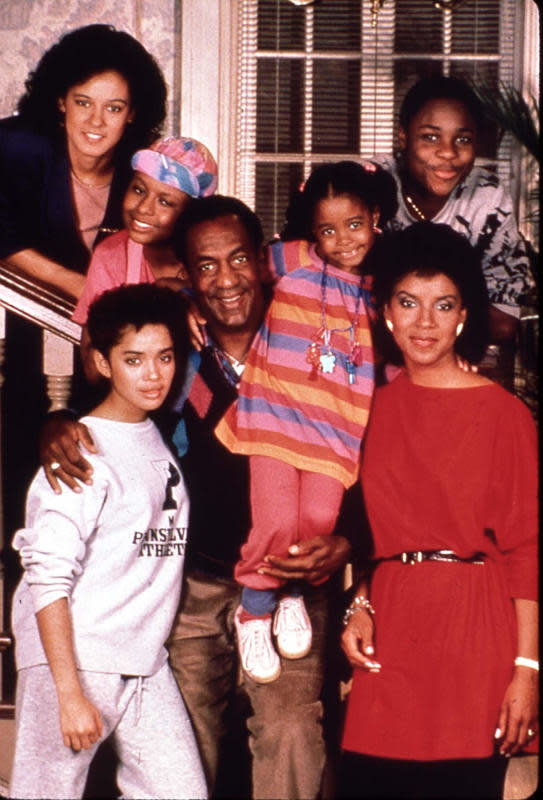
NBC
The Cosby Show (NBC, 1984-92)
Premise: The Huxtables are a well-to-do family living in a Brooklyn brownstone. Cliff (Bill Cosby) is a doctor; his wife, Clair (Phylicia Rashad) is a hard-charging lawyer. They also have five kids, including stylish rebel Denise (Lisa Bonet) and precocious Rudy (Keshia Knight Pulliam). The parenthood struggle is all too real...and hilarious.
Why It Matters: When the mega-smash sitcom premiered in the fall of 1984, “A whole generation started watching a Black family on TV in a way that wasn’t stereotypical,” Butler says. “Cliff and Clair were upwardly mobile and had a real partnership in the way they raised their children. It was a wonderful show.” However, she notes that Cosby’s recent assault allegations have cast a pall on its legacy: “Unfortunately, I think it’s impossible to separate The Cosby Show from Bill Cosby and his behavior as a person.”
Behind the Scenes: All five of the Huxtable children were based on Cosby’s actual children. The character of Theo (Malcolm-Jamal Warner) was inspired by his late son, Ennis—as was his dyslexia diagnosis. “I’m still proud of its legacy,” Warner said in 2023. “The family dynamic was one that practically every family—no matter the ethnicity, socioeconomic status or even family makeup—could find something to relate to.”
Must-Watch Episode: “Happy Anniversary,” (Season 2, Episode 3)
Streaming on Prime Video
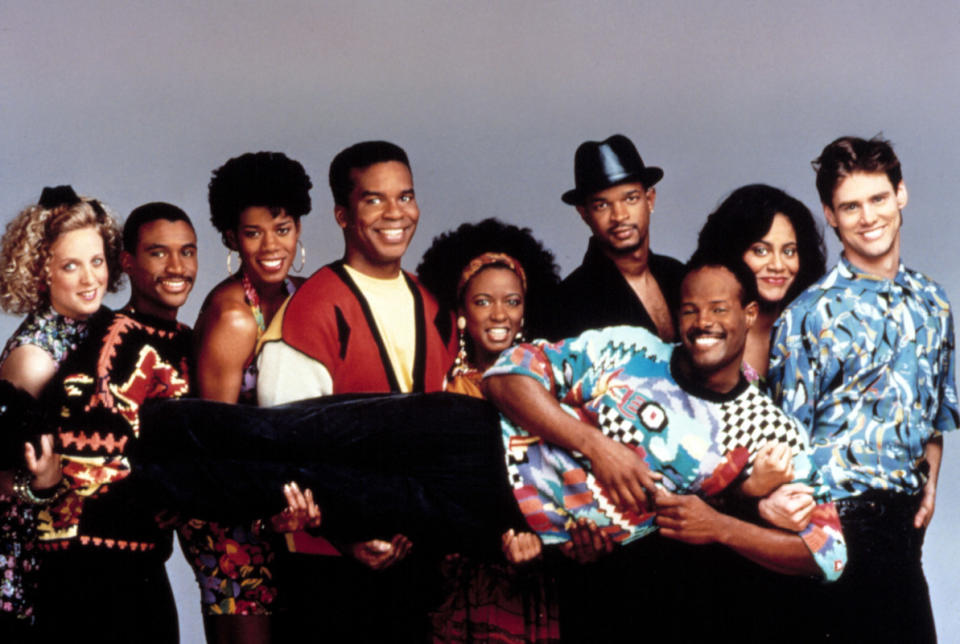
Fox
In Living Color (Fox, 1990-94)
Premise: The irreverent variety show created by and starring Keenen Ivory Wayans featured a predominantly Black cast, including future breakouts Damon Wayans, David Alan Grier and Jamie Foxx. Plus, Jennifer Lopez was a Fly Girl dancer. It also propelled the then-fledgling Fox network to new pop-culture heights.
Why It Matters: Thanks to outrageous characters like Homey D. Clown, Wanda Wayne and Men on Films, the show boldly went where Saturday Night Live wouldn’t dare. In prime time, no less. “This was a show that brought in a lot of Black and Brown comedians who had been working for years and never got the spotlight,” Butler says. “So there was something inherently Black about the humor that you weren’t going to get from SNL.”
Behind the Scenes: By the series’ third season in 1992, it had so much clout that Fox decided to run a live special as counter-programming to the more conservative Super Bowl halftime show. Among the sketches: “Men on Football” with sexual innuendos galore. “There was a Fox executive in the booth with a 60-second delay button and they could have hit the button anytime they wanted,” Keenen Ivory Wayans said in 2019. “But they wanted the controversy.” The next year, the Super Bowl hired Michael Jackson to perform at halftime.
Must-Watch Episode: Pilot (Season 1, Episode 1)
Streaming on YouTube
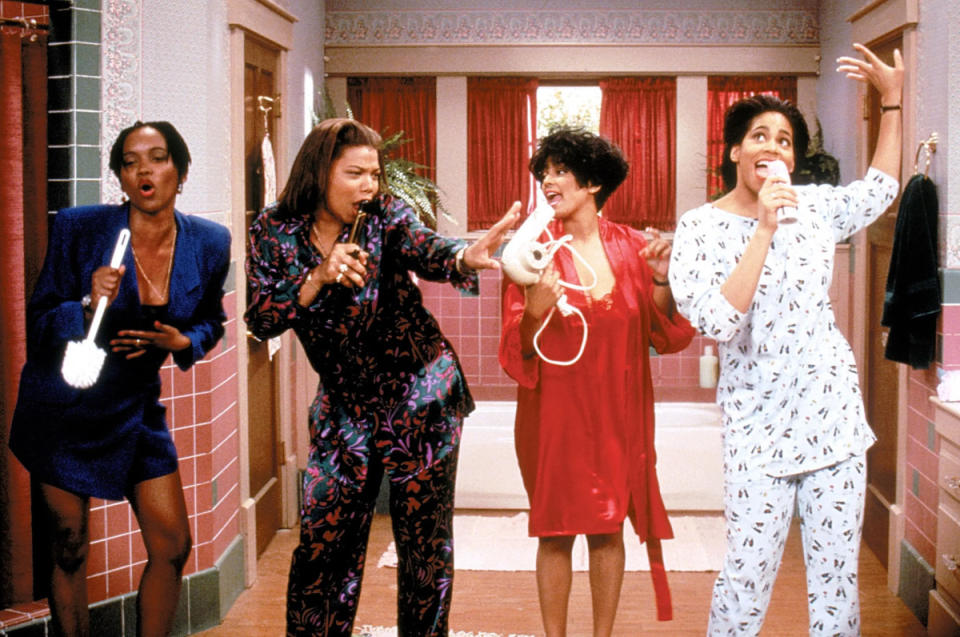
Fox
Living Single (Fox, 1993-98)
Premise: Queen Latifah is Khadijah James, the mastermind behind a monthly magazine. She lives it up in Brooklyn with her cousin Synclaire (Kim Coles) and friend, would-be diva Regine (Kim Fields). Pit-bull lawyer Max (Erika Alexander), handyman Overton (John Henton) and stockbroker Kyle (Terrence C. Carson) round out the bunch.
Why It Matters: A year before Friends, this sitcom featured six upscale twenty-somethings relying on each other while trying to make it in New York City. There was one noticeable difference, of course. “This is a really important show because it highlighted another universal experience, which is friendship,” Butler says. “It was meaningful to watch young Black professionals have this dynamic group. And the women were people you knew.”
Behind the Scenes: At the end of the pilot, the ladies grab bathroom appliances and sing and dance to “My Girl.” It wasn’t a coincidence, as the show was originally titled My Girls. The show’s creator, Yvette Lee Bowser, also handpicked each member of the main cast: “Knowing who I wanted those characters to be, I built the ensemble around them,” she said in 2023. Queen Latifah and Coles came onboard early because of their development deals.
Must-Watch Episode: “Great Expectations” (Season 1, Episode 6)
Streaming on Hulu, Max, Prime Video and Apple TV
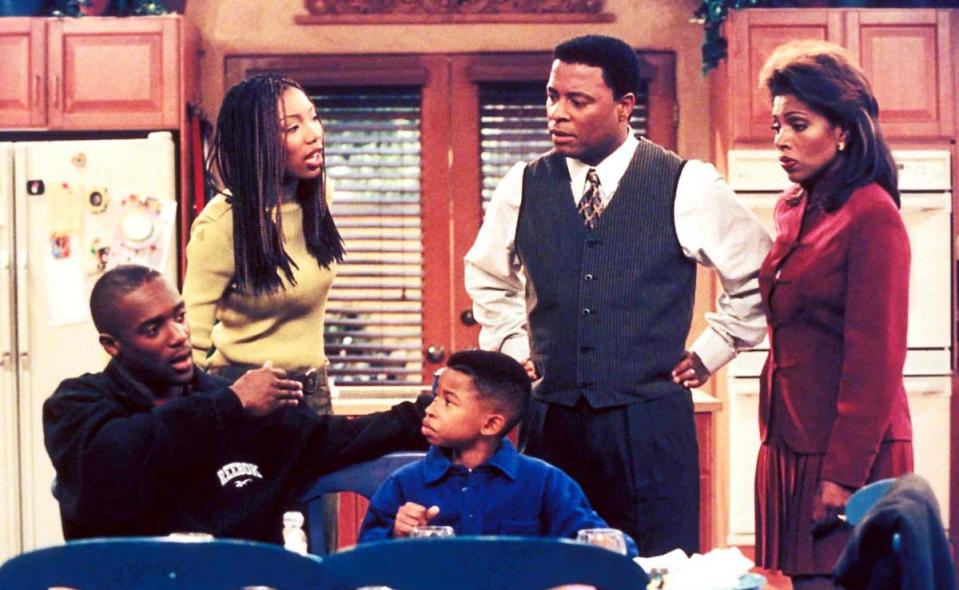
UPN
Moesha (UPN, 1996-2001)
Premise: Brandy plays the show’s titular character, a teen living with her middle-class family in South Central with her younger brother, Myles (Marcus T. Paulk), father Frank (William Allen Young) and his new wife, Dee (Sheryl Lee Ralph). Moesha also has a circle of friends—including the chatty Kim (Countess Vaughn)—and loves to frequent The Den.
Why It Matters: One of UPN’s biggest hits took on important issues like race, drugs, sex and infidelity. It also starred one of the hottest pop singers of her day. “Adolescence can be a pretty awful experience and it can be detrimental to not see that reflected on TV; this was the exception,” Butler says. “To be a fan of Brandy and then see her as Moesha navigating her life was very meaningful to a lot of Black girls.”
Behind the Scenes: There was palpable strife between Brandy and breakout star Vaughn, who later got her own spinoff with The Parkers. Per a 1998 Ebony interview, Vaughn even called the singer a “B---h” during filming. The bad blood went on for years until Vaughn wrote an open apology letter on Instagram in 2015. Brandy responded with, “You are beautiful to me. Always have been and always will be!”
Must-Watch Episode: “Model Employee,” (Season 3, Episode 18)
Streaming on Paramount+, Roku Channel, Prime Video, Pluto
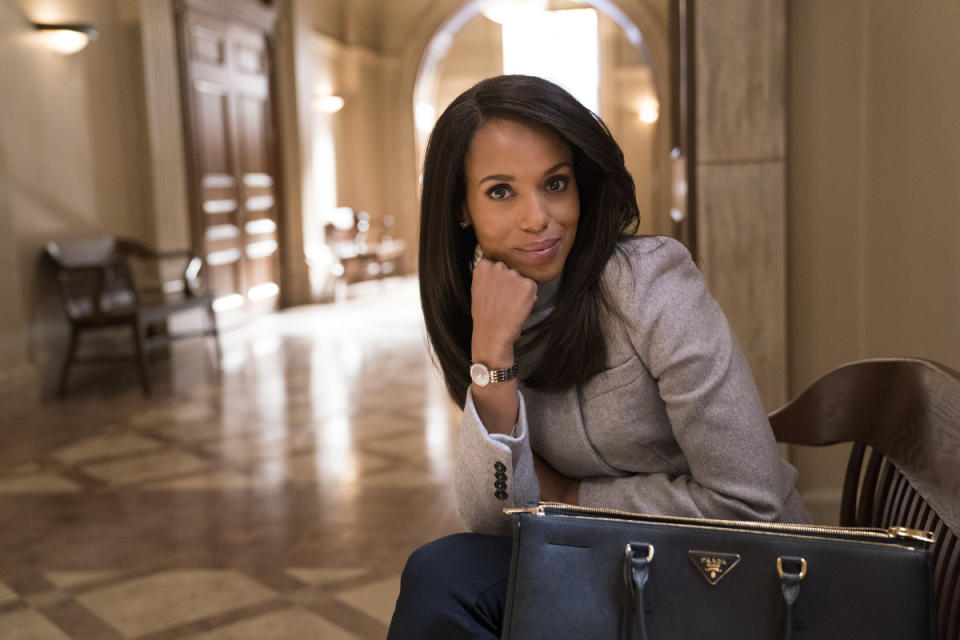
Getty Images
Scandal (ABC, 2012-18)
Premise: Olivia Pope (Kerry Washington) is a sharply dressed Washington D.C. fixer with a penchant for yelling “It’s handled!” when asked to perform any task. Each week, Olivia and her “Gladiators” at her crisis-management firm tackle a different case, using major spin to cover up affairs and even the occasional killing. She’s also in love with the President of the United States (Tony Goldwyn).
Why It Matters: During its heyday, the juicy drama created by powerhouse producer Shonda Rhimes was a did-you-see-it social sensation. Emphasis on drama. “There were so few Black dramas for decades because the emphasis was placed on comedy and people in outrageous situations,” Butler says. “But with Shonda Rhimes at the helm, she felt a responsibility to show a flawed Black woman doing her thing day in and day out.” Washington was also nominated for two Emmys.
Behind the Scenes: Both Taraji P. Henson and Gabrielle Union were in top contention for the role of Olivia before Washington nabbed it. But there are no hard feelings. Said Union in 2013, “It’s very rare to have a Black female lead who gets to do stuff . . . So, to have the opportunity to even audition for a role like that was awesome. And Kerry does such an amazing job.” Henson added in 2015, “When I went in to read for Shonda Rhimes, in my mind I was like, ‘This is Kerry Washington. Why am I even in here?’ . . . It was her job and she’s great in it.”
Must-Watch Episode: “It’s Handled” (Season 3, Episode 1)
Streaming on Hulu and Prime Video
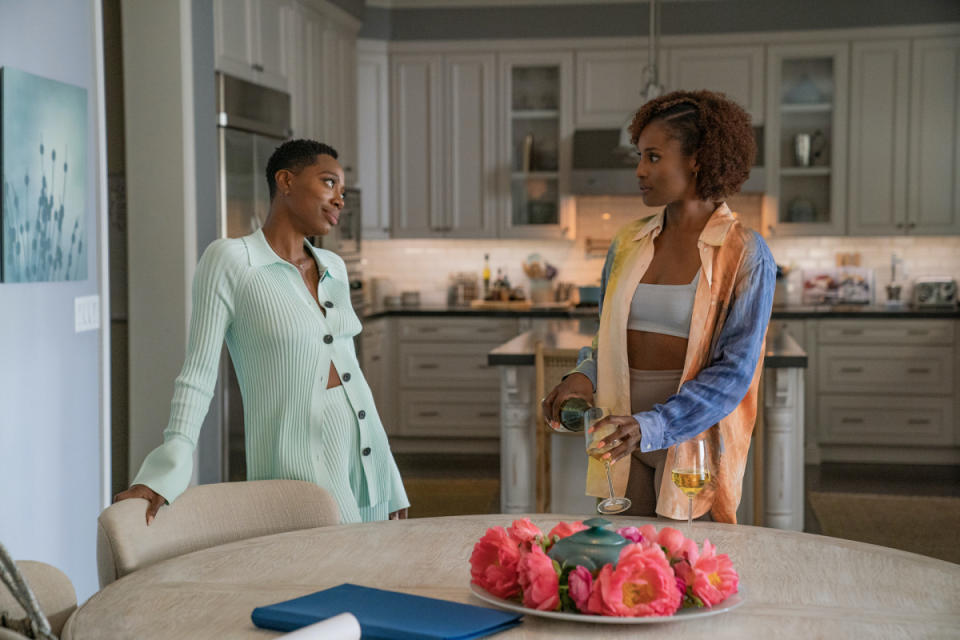
HBO
Insecure (HBO, 2016-21)
Premise: Two modern-day Black women (played by co-creator and writer Issa Rae and Yvonne Orji)—best friends since graduating Stanford—juggle work and a myriad of relationships in their South L.A. neighborhood.
Why It Mattered: In a refreshing update on Living Single, the comedy—loosely based on Rae’s acclaimed Web series Awkward Black Girl—portrayed relatable characters and highlighted the subtleties of everyday life through friendship, romances and careers. It also took on headier issues like mental health and race. “This is a depiction of being young and figuring out what it means to be an adult,” Butler explains. For Black Millennials, “It resonated in a special way.”
Behind the Scenes: Orji said in 2020 that she first interacted with Rae after writing her on Twitter to say she was a fan of Awkward Black Girl. The actress says that Rae responded and invited her to her wine and game night at her house. “Of course I get to her house and her friends are like, ‘What? Issa is inviting people to the house off Twitter?’” she said. By the time she auditioned for Insecure, “We weren’t best friends, but we had a rapport.”
Must-Watch Episode: “High-Like” (Season 3, Episode 5)
Streaming on Max
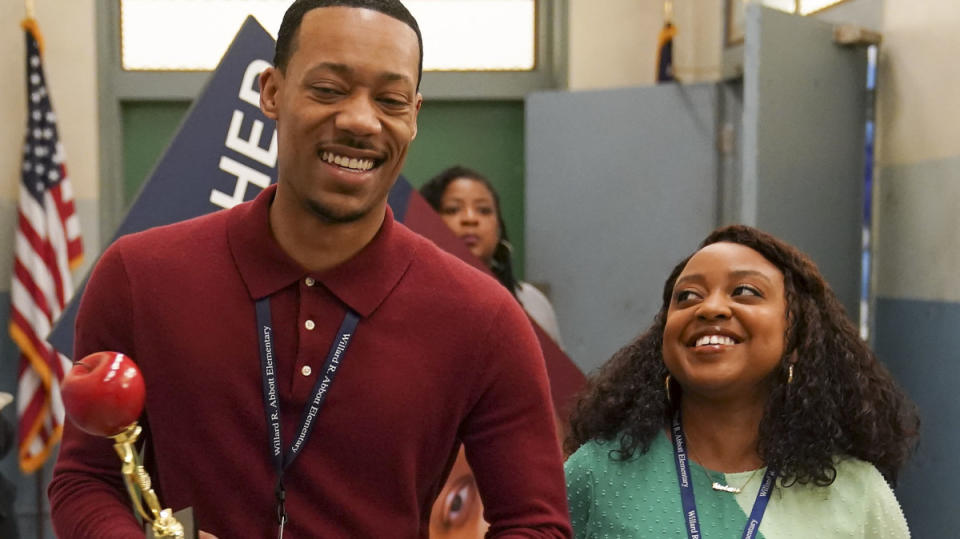
ABC/Gilles Mingasson
Abbott Elementary (ABC, 2021-)
Premise: For this mockumentary-style workplace comedy, a group of dedicated teachers are brought together in a Philadelphia public school. Despite the odds stacked against them, they’re determined to help their students succeed. Taking the lead: writer Quinta Brunson’s optimistic second-grade teacher, Janine Teagues.
Why It Matters: “It goes back to Quinta,” says Butler of the Emmy-winning writer, creator and star. “She created a personal story inspired by her own experiences at school and is able to tell a story that’s really funny and touching to everyone—not just Black people. It shows how far we’ve come in presenting authentic Black stories and recognizing talent.”
Behind the Scenes: Yes, Brunson has said that her mother’s 40-year career as a schoolteacher inspired her to create the show. Sheryl Lee Ralph’s character is based on Mom, and the title is a tribute to her elementary school teacher, Joyce Abbott. But she’s not here to impart hard lessons: “I simply want to make people laugh,” she said in 2022. “That’s all I’m here for. Which is the beauty of the 22-minute sitcom: It can only do so much.”
Must-Watch Episode: “Student Transfer,” (Season 1, Episode 5)
Streaming on Hulu, Max, Prime Video and Vudu
Next, When Will 'Abbott Elementary' Be Back? Everything to Know About Season 3
